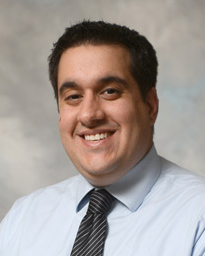Faculty News
Critical Care Cougar
UHCOP Faculty Member Matthew Wanat Among First Practitioners to Become Board Certified Critical Care Pharmacist
UH College of Pharmacy Clinical Assistant Professor Matthew A. Wanat, Pharm.D., BCPS, is among the first pharmacy practitioners to be recognized as a Board Certified Critical Care Pharmacist.
 The Board of Pharmacy Specialties approved the board certification in critical care, along with a separate specialty in pediatric pharmacy, in 2013 and first administered the exam this year. The process for the new BCCCP was initiated by a joint petition by the American College of Clinical Pharmacy, American Pharmacists Association, and American Society of Health-System Pharmacists. As of mid-December, there were only 29 BCCCP recognized pharmacists in Texas and fewer than 600 nationwide.
The Board of Pharmacy Specialties approved the board certification in critical care, along with a separate specialty in pediatric pharmacy, in 2013 and first administered the exam this year. The process for the new BCCCP was initiated by a joint petition by the American College of Clinical Pharmacy, American Pharmacists Association, and American Society of Health-System Pharmacists. As of mid-December, there were only 29 BCCCP recognized pharmacists in Texas and fewer than 600 nationwide.
According to the April 2013 news release announcing the move on the BPS website, the petition stated, "The practice requires informed, rapid assessment of clinical data for patients whose pharmacokinetic and pharmacodynamic parameters differ substantially from the non-critically ill patient. Pharmacists in this practice are required to review, analyze, and frequently reassess multifaceted clinical and technological information to make reasoned decisions for highly dynamic patients with life-threatening conditions and complex medication regimens."
"Board certification demonstrates to colleagues (physicians, nurses, and pharmacists), patients and our students that the clinician is prepared and knowledgeable to effectively take care of critically ill patients," Wanat said. When you have appropriate training and board certification in a pharmacy specialty, I think it gives an additional level of reassurance to our students that they are learning from an expert in the field. I ultimately pursued board certification for our students and for my own personal growth."
In addition to passing the exam, eligibility requirements include a pharmacy degree from an accredited U.S. college or school of pharmacy; a current, active pharmacy license; and varying degrees of experience in critical care acquired through professional practice and/or accredited residencies.
"It’s quite an honor to be among the first cohort of pharmacists to receive board certification in our specialty area," Wanat said. "Critical care was one of the first practice areas where clinical pharmacists demonstrated a positive impact on medication outcomes and lowering adverse drug events, so it’s nice to finally be recognized by BPS as a specialty."